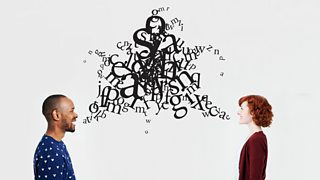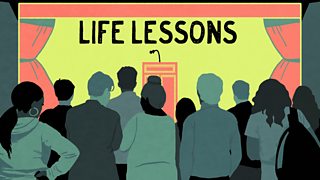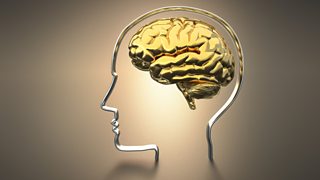How we can all outsmart awkwardness
Awkward. It’s our favourite hashtag and emoji. We run a mile from it but, as Brits, we’re also remarkably good at it.
Annalisa Dinnella has a degenerative sight condition that has left her with 5% vision. When you have a disability “awkwardness becomes a thing in your life,” she says. It “gets in your way and in your face and in your hair, and it’s really irritating. It’s life draining.” So, in Annalisa Is Awkward, she sets out to wrestle awkward to the ground, shove it under a microscope, and surgically remove its power.
She asks: how best can we outsmart awkwardness?

Try and respond in a natural way
Annalisa meets comedian and actor Jess Thom, who has Tourette’s Syndrome. Her involuntary physical and verbal tics, and the fact that she is a wheelchair user, can be a source of awkwardness for others.
“I think that awkwardness is something that we learn rather than something that’s instinctive, because children really aren’t awkward in that way at all”, Jess says. Toddlers will often presume her tics are for their own amusement and respond in a very natural, “joyful” way. The awkwardness arises when adults crush that natural response, she says, “sending the message that difference is bad.”
When she meets people, or gets on stage, she encourages individuals to respond naturally to her tics: “Sometimes that will mean laughing, sometimes that will mean wincing… sometimes that will mean ignoring them.” But whatever comes naturally, she says, is OK.
Admit to feeling awkward
Psychiatrist Raj Persaud says it can be better to open up to awkwardness, rather than try to hide it.
He offers up an example: when the first Asian family moves into a street of white people it might make those residents feel awkward because they’ve never had Asian neighbours before. But “isn’t it better maybe that they owned up to the awkwardness rather than be silent about it?” Raj poses.
Annalisa agrees: “anything unspoken is tremendously awkward.”
If someone is grieving, donβt worry about saying the βwrongβ thing
“If someone close to me is grieving, I worry about saying or doing the wrong thing to the extent that I’m probably being really awkward,” says Annalisa. It’s a concern that many of us would admit to having.
Comedian Cariad Lloyd hosts a popular podcast called Griefcast, and it’s breaking down our very British resistance to death chat and providing a safe, joyful place for people to talk about loss.
Cariad lost her own father when she was 15 and is familiar with the silences around death: “People don’t know what to say a lot of the time... I’m a big believer in giving it a try.” She says attempting to say something and getting it wrong is better than saying nothing at all. We should remember that “the worst thing has happened” already, in that a loved one has died. Accidentally saying the wrong thing will never be worse than that.

If youβve made a mistake, own it
“People are very bad at being wrong,” says Cariad. “We’re very bad at saying, ‘I didn’t know that and I think I said something that was a bit inappropriate, I’m really sorry.’”
The fact is, people would often rather be awkward than change or apologise, but all we need to do is start from ‘sorry’, the comedian says, “it’s so much easier.”
If you’ve had an argument or done the wrong thing, don’t tip toe around the issue. Admit that you’re wrong, talk things over openly – and watch the awkward tension disappear.
Embrace your limitations
Raj Persaud says, “we spend a lot of time in pubs and middle class dinner parties declaiming like we’re experts.” But, he believes the truly intellectual thing to do is “to own up to our ignorance and say ‘I don’t get it,’” rather than worry that we have to know everything all the time.
One prescription for the cure for awkwardness is to embrace our limitations. When Socrates is tried for impiety and arrogance he stands up in court and says, “I don’t think I know anything.” And that’s what makes him the wisest man in Greece, says Raj, “he knows when he doesn’t know.”
Silences in conversations: awkward or do we need them?

Lapses in conversation give us a clue as to how all this turn-taking takes place with precise millisecond timing.
Donβt stay silent in the face of difficult situations
Silence is often not just awkward but actually damaging.
Jess Thom was the victim of a hate crime when, on a bus, a woman was verbally and physically abusive towards her. But, Jess says, that wasn’t what hurt the most. It was the awkward silence of the people around her after the abuser had left that stung more. Rather than voicing how awful the event was and asking if she was OK, they did nothing.
“That is where awkwardness is at its most damaging,” says Jess. “That is the awkwardness that will clutter up our minds, clutter up our society, do damage.” It’s not that bad things happen, that people have horrible experiences, or have to deal with bodies that work differently, “the awkwardness, the silence, the lack of solidarity, the lack of humanity, the lack of empathy – those are the things that are ultimately destructive.”
"Is it ok to laugh at your tics?"

Comedian and actor Jess Thom on people's awkwardness and reactions to her Tourette's.
Tips for busting awkwardness
- Always respond as naturally as you can – even if that feels like a difficult thing to do.
- Own up to feeling awkward – hiding it will almost always make things worse.
- If you’ve had an argument or done the wrong thing, admit your mistake and talk about it. As Comedian Cariad Lloyd says, start with a simple “sorry”.
- If someone is grieving, don’t worry about saying the wrong thing – just start by saying something. You can’t make things worse but you might make things better.
- If someone is having a hard time, speak up or step in. It is more awkward, and even damaging, to stay silent.
- Embrace your limitations. It’s ok to not know the answer but it’s awkward to pretend you do.
More from Radio 4
-
![]()
Annalisa Is Awkward
What are we all so awkward about? Annalisa Dinnella explores this slippery emotion.
-
![]()
Life Lessons podcast
Young UK adults talk about the issues that matter most to them - and why they should matter to all of us.
-
![]()
How you can learn to be happier
Life lessons of happiness to learn how you can hack your happiness back.
-
![]()
Ways you are being influenced without even realising it
The enigmatic social science that's controlling you right now.




